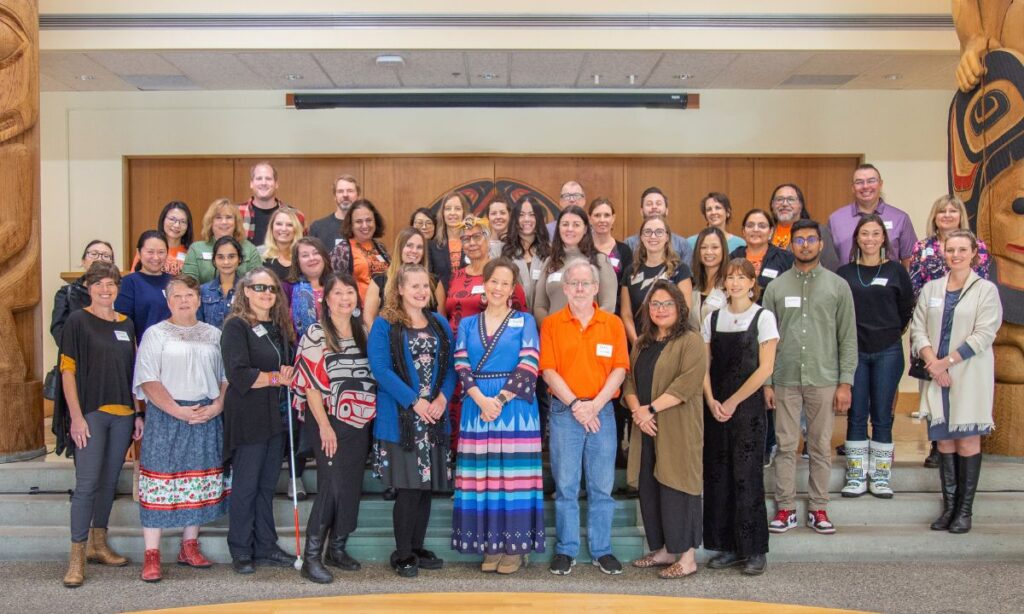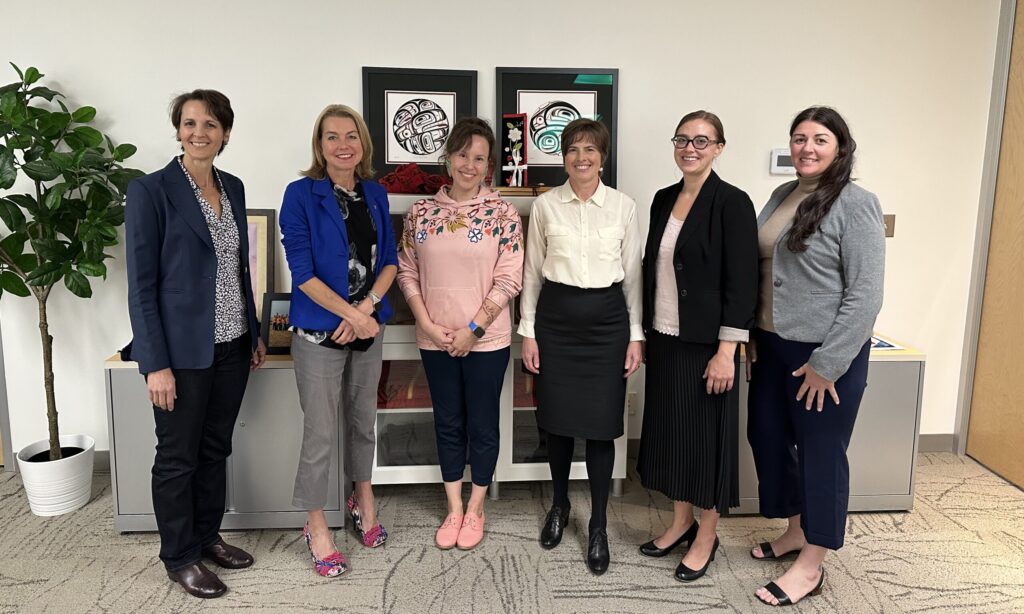The School of Population and Public Health (SPPH) stands as a cornerstone of excellence in research and advocacy for public health in BC, Canada and beyond. With a commitment to improving societal health, SPPH serves as a catalyst for evidence-informed policies and programs that nurture the well-being of communities.
Embarking on our ongoing series spotlighting the centers within SPPH, we set our sights on the transformative realm of the Human Early Learning Partnership (HELP). As we celebrate National Child Day on November 20, join us in exploring how HELP’s pioneering research is strengthening the health and well-being of children.
Overview
HELP was established by Dr. Clyde Hertzman and Dr. Hillel Goelman in 1999. Located within SPPH, it is an inter-disciplinary, collaborative research and knowledge mobilization centre dedicated to improving conditions that promote an equitable start in life for all children and their families.
HELP has been a central voice in raising the importance of early childhood experiences and environments and how they shape lifelong health and development. The centre is recognized as a global leader in its field, with Dr. Hertzman successfully advocating to have early childhood development included as a social determinant of health in the World Health Organization’s definition.
The centre’s research collaborations foster connections between scientific, government, education, health, and community sectors while creating unique partnerships and building momentum toward improving outcomes for all children and youth.
HELP’s unique approach bridges relationships, data, expertise, and impact. Learn more here
Over the past two decades, the Aboriginal Steering Committee (ASC) at HELP has supported a deeper understanding of the social and cultural determinants of Indigenous children’s health and well-being in the context of Canada’s colonial history and legacy of residential schools. ASC members are leaders, and Elders from First Nations and Métis communities in BC and Canada who share common interest in improving developmental outcomes for all First Nations, Inuit, and Métis children and youth in BC.

2023 marked two decades of collaborative dedication between the Aboriginal Steering Committee (ASC) and Human Early Learning Partnership (HELP). On October 5, ASC and HELP hosted a celebration in the First Nations Longhouse in honour of this important achievement.
Research Focus
Research by HELP examines children’s development, health and well-being at the population level, as well as within communities, exploring the conditions necessary to close the outcome gap and increase equity across populations. The centre aims to ensure that all children have access to the environments needed for healthy development, increasing equitable access to needed supports, flattening the socio-economic gradient, and mitigating geographic variability in outcomes.
Child Development Monitoring System
Alongside faculty and affiliate research, HELP collects population-level data through the Child Development Monitoring System (Monitoring System), reflecting multiple developmental stages in the early life course, from 18 months to 18 years of age.

The Monitoring System consists of five questionnaires that gather information on critical periods of children’s development, exploring individual, family, and community factors from a diversity of perspectives — from parents, teachers, and children themselves. These questionnaires support the collection of data about children’s outcomes, experiences, and environments that are needed to address and answer the question: “What are the differences that make a difference?”
Explore the individual Monitoring System tools
Impacts
HELP has been proactive in undertaking research that supports evidence-informed innovation and improvements in health and social policy.
Their research excellence and population health data has informed provincial poverty reduction policy and advocacy initiatives, provincial mental health strategies and frameworks, provincial education frameworks promoting social and emotional learning and BC’s Mental Health in Schools Strategy.
HELP’s data and research have also been used to facilitate the support of cross-sectoral networks and coalitions focused on supporting children and youth in regions across BC, informing the creation of over 1000 community-level programs and services tailored to address the unique circumstances and barriers in these communities.
These initiatives, from pre-natal to school-based, have contributed to promoting the health of children and families across the province.
Learn more about HELP’s impact
Notably, HELP has received funding from the Ministry of Children and Family Development, Ministry of Education and Child Care, Ministry of Health, and the Ministry of Mental Health and Addictions for many years, supporting not only Monitoring System data collection, but also research and knowledge mobilization.

Minister of Children and Family Development visited the HELP team in September 2022, to learn more about how the BC Government’s investment in HELP supported the creation of the Child Development Monitoring System.
More recently, the Ministry of Education and Child Care has partnered with UBC’s Human Early Learning Partnership (HELP) to build capacity in Compassionate Systems Leadership (CSL) province-wide. Led by Joanne Schroeder, the CSL approach in BC comprises an integrated framework for developing capabilities and knowledge that strengthen the capacity of individuals and collectives to progress systems change initiatives effectively. CSL aims to create a sustainable infrastructure to support the education system to integrate compassion into everyday work.
Learn more about Compassionate Systems Leadership (CSL)
People
The centre currently has eight faculty members within UBC and six affiliate faculty members from other post-secondary institutions. Each faculty member has their own program of research which together contribute to HELP’s interdisciplinary understanding of child and youth development.
In addition to its faculty, HELP has a staff of 33 that work across the areas of data collection, e-systems and reporting, data analysis and management, and knowledge mobilization. These teams work closely with faculty, affiliates, and a large network of graduate and post-graduate students.
For a full list of HELP faculty, affiliates, and staff, visit HELP’s Team Page.
Meet the Faculty
Dr. Mariana Brussoni (Director of HELP) is a Professor in the Department of Pediatrics and SPPH at UBC and is an investigator with the British Columbia Children’s Hospital Research Institute. Mariana’s research is dedicated to studying child injury prevention and children’s outdoor play, looking at developmental benefits of play and how parents, outdoor environments, and policies can promote outdoor play for children. Learn more via OutsidePlay.org
Dr. Matt Carwana is a pediatrician and clinician-investigator at BC Children’s Hospital. Matt’s research sits at the intersection of social justice, public health, and clinical pediatrics and seeks to improve quality of care and health outcomes for structurally marginalized children, youth and families. He is passionate about “centring the margins” and ensuring that equity is considered in all facets of research.
Dr. Anne Gadermann is an Associate Professor in SPPH and Research Scientist at the Centre for Health Evaluation and Outcomes Sciences (CHÉOS), Providence Health Care Research Institute. Anne’s research focuses on the social determinants of mental health and well-being in various populations, including children and youth and individuals who are homeless and vulnerably housed.
Dr. Martin Guhn is an Associate Professor in the SPPH as well as a member of the Canadian Council on the Social Determinants of Health. Martin’s research focuses on understanding how early childhood experiences and social, cultural, demographic, and socio-economic context factors are related to children’s and adolescents’ development, health, wellbeing, and education, and draws from the Child Development Monitoring System.
Dr. Emily Jenkins is a Registered Nurse and Associate Professor in the School of Nursing at UBC and is the Scientific Director of Wellstream: The Canadian Centre for Innovation in Child and Youth Mental Health and Substance Use. Emily’s research aims to enhance mental health outcomes and reduce substance use harms for children, youth and their communities.
Dr. Eva Oberle is an Associate Professor in SPPH and is the current Principal Investigator of the Middle Years Development Instrument (MDI). Eva’s research interests include examining factors that predict positive youth development and resilience, with a central aspect of her research focusing on understanding the role of social relationships with peers, teachers, and families in promoting mental health and wellbeing in schools and communities.
Dr. Brenda Poon is a faculty member in SPPH and is also Research Division Lead at the Wavefront Centre for Communication Accessibility. Brenda’s academic-community partnerships focus on understanding ways that 1) community capacity and cohesion, intersectoral collaboration, and coordinated models of service delivery influence health and health inequalities, and 2) community-based knowledge creation can be applied to support best practices/policy and have meaningful impacts that address community priority issues and needs. Learn more via CoRE-LAB.
Dr. Christine Voss is an Assistant Professor in the Department of Pediatrics at UBC and is primarily based at the UBC Centre for Chronic Disease Prevention and Management on the UBC Okanagan campus in Kelowna. Christine’s overall research goals are to better understand how physical activity behaviours relate to current and long-term health outcomes in children in both clinical and community-based settings, and to identify strategies to improve physical activity participation in children.
For future updates on HELP’s commitment to shaping a future where every child not only survives but thrives, be sure to subscribe to their newsletter, HELP Connect.
Stay tuned for more as we continue our SPPH centre series, unraveling the impactful work across our diverse research hubs.